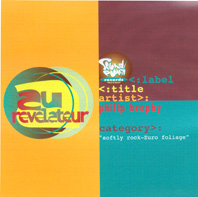: philip brophy
Sound Punch, 2004, Hurt-008
www.philipbrophy.com
 Philip Brophy has made a manifold contribution to Australian screen/sound culture as a composer, curator, critic and teacher across media (installation, CD, live performance, journals, popular forums). His Sound Punch label has released 9 CDs by Brophy and others over the last 6 years. The latest is Aurévélateur which, like Beautiful Cyborg (see review) (2002), was originally devised for live performance as a score-in this case to director Philippe Garrel's bizarre filmic critique of the bourgeois family, Le révélateur (1968). Garrel's movie largely consists of the silent flight of a family through a mostly empty, darkened landscape; a fractured retreat in terror from an unseen threat. This scenario is intended to represent the tensions and paranoias of the capitalist family. Le révélateur's startling power comes from its opacity, from the weird hyper-investment of the images which is partly created by Garrel's deliberate use of silence rather than soundtrack. It is therefore hard to see what Brophy's music might add beyond a certain banality of theme, an emotional/musical consistency, or a sense of dated historicism—not least as Brophy's broadly unified score tends to sew together Garrel's deliberately disjointed scenography.
Philip Brophy has made a manifold contribution to Australian screen/sound culture as a composer, curator, critic and teacher across media (installation, CD, live performance, journals, popular forums). His Sound Punch label has released 9 CDs by Brophy and others over the last 6 years. The latest is Aurévélateur which, like Beautiful Cyborg (see review) (2002), was originally devised for live performance as a score-in this case to director Philippe Garrel's bizarre filmic critique of the bourgeois family, Le révélateur (1968). Garrel's movie largely consists of the silent flight of a family through a mostly empty, darkened landscape; a fractured retreat in terror from an unseen threat. This scenario is intended to represent the tensions and paranoias of the capitalist family. Le révélateur's startling power comes from its opacity, from the weird hyper-investment of the images which is partly created by Garrel's deliberate use of silence rather than soundtrack. It is therefore hard to see what Brophy's music might add beyond a certain banality of theme, an emotional/musical consistency, or a sense of dated historicism—not least as Brophy's broadly unified score tends to sew together Garrel's deliberately disjointed scenography.
Like Beautiful Cyborg therefore, Aurévélateur is most satisfying if one ignores its filmic origins and considers it as a purely listening experience. At this level, Aurévélateur functions as probably the most poppy and accessible of the Sound Punch releases. With Dave Brown of Lazy and Candlesnuffer fame adding bass and guitar, and Sianna Lee vocals, Brophy's keyboard and drums come together to produce something very much akin to the revival of late punk, 'kraut-rock' and post-punk electronica which has recently been produced by Ladytron, Chicks on Speed, Life Without Buildings, Rocket Science, Franz Ferdinand and indeed too many bands to name. Brophy's melange brings forth something more of late 1960s, early 70s psychedelia and head-music to the mix than most of these other re-interpreters (the vaguely Jefferson-Airplane-like neo-lounge of Broadcast aside). In the end though, there is little that one would not hear at a good night either at the Factory during a performance of the Exploding Plastic Inevitable, the Velvet Underground or Lou Reed, or perhaps during one of the later Koolaid Acid Tests with the Grateful Dead et al. This is fine, but it is not very remarkable. In addition Brophy tries to underline the theme of Le révélateur with 2 versions of David Bowie's epic Heroes. Part of what made this song work was the sense of desperation and vocal friction in Bowie's enunciation as he begins to cry out at the finale with a wonderful technique that takes him close to a scream. Brophy by contrast sings “I wish I could swim / like dolphins can swim” in an oh-so-cool, presumably ironical, postmodern, deadpan fashion, all but eviscerating Bowie's masterpiece.
Brophy has described his recording as not so much a new score but a “riff” on Garret's film. One must therefore ask what Brophy has added to the heritage, sounds, dynamics and images of late 60s, early 70s culture with his noodlings, and conclude not all that much. Heroes aside, this CD makes for a good listen, with dirty guitar and Moe-Tucker-style drumming interspersed with loungey organ. However I would advise those seeking to add to their collection to go through Sound Punch's fantastic back catalogue before considering this particular release.
Jonathan Marshall






